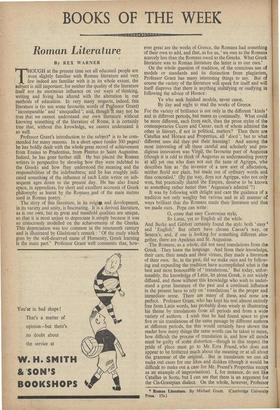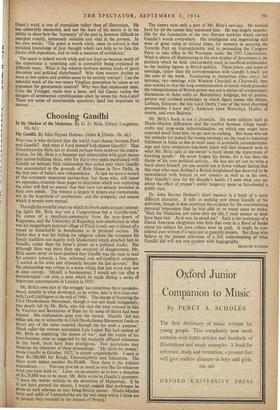Roman Literature
By REX WARNER HOUGH at the present time not all educated people are even slightly familiar with Roman literature and very few indeed are familiar with it in its whole extent, the subject is still important; for neither the quality of the literature itself nor its enormous influence on our ways of thinking, writing and living has altered with the alteration in our methods of education. In very many respects, indeed, this literature is (to use some favourite words of Prgfessor Grant) incomparable' and unequalled '; and, though' 1 may not be true that we cannot understand our own literature without knowing something of the literature of Rome, it is certainly true that, without this knowledge, we cannot understand it so well.
Professor Grant's introduction to the subject* is to be com- mended for many reasons. In a short space (under 300 pages)`. he has boldly dealt with the whole great record of achievement from Ennius to Prudentius, from Plautus to Saint Augustine. Indeed, he has gone further still. He has placed the Roman writers in perspective by showing how they were indebted to the Greeks and how they understood the meaning and the responsibilities of the indebtedness; and he has roughly indi- cated something of the influence of each Latin writer on sub- sequent ages down to the present day. He has also found space, in appendices, for short and excellent accounts of Greek philosophy as learnt by the Romans and of the main metres used in Roman poetry. ' The story of this literature, in its origie and development, in its variety and unity, is fascinating. It is a derived literature, as is our own, but its grea,t and manifold qualities are unique, so that it is most unjust to depreciate it simply because it was so consciously modelled on the achievements of the Greeks. This depreciation was too common in the nineteenth century and is illustrated by Gladstone's remark : Of the study which goes by the well-deserved name of Humanity, Greek learning is the main part.' Professor Grant well comments that, how- ever great are the works of Greece, the Romans had something of their own to add, and that, as for us, we owe to the Romans scarcely less than the Romans owed to the Greeks. What Greek literature was to Roman literature the latter is to our own.'
On the whole question of tradition, of the conscious use of models or standards and its distinction from plagiarism, Professor Grant has many interesting things to say. But of course the variety of the literature will speak for itself and will itself disprove that there is anything stultifying or ossifying in following the advice of Horace : Ye who seek finished models, never cease, By day and night to read the works of Greece.
For the variety of brilliance is not only in the different kinds' and in different periods, but meets us continually. What could be more different, each from each, than the prose styles of the contemporaries Cicero and Caesar, each of whom admired the other in literary, if not in political, matters? Then there are Catullus and Horace and Propertius, all docti '; but to what different uses did they put their learning! And among the most interesting of all these careful and scholarly and pro- digious innovators was Virgil, the favourite poet of Augustus (though it is odd to think of Augustus as understanding poetry at all) yet one who does not suit the taste of Agrippa, who describes him as the inventor of a new sort of affectation, neither florid nor plain, but made out of ordinary words and thus concealed.' (By the way, does not Agrippa, who not only won, but practically shared the Empire, deserve to be known as something rather better than Augustus's admiral '7) It was by following with delight and care the guidance of a tradition not only weighty but various and in all manner of ways brilliant that the Romans made their literature and that we made ours. Pope can write : 0, come that easy Ciceronian style, So Latin, yet so English all the while.
And Burke and Gibbon certainly found the style both easy and English.' But others have chosen Caesar's way, or Seneca's: and, if one is looking for something different alto- gether, there are Apuleius and St. Augustine. The Romans, as a whole, did not need translations from the Greek. They knew the language. And from their.knowledge, their care, their needs and their virtues, they made a literature of their own. So, in the past, did we make ours and by follow- ing and expanding the tradition have accomplished what is the best and most honourable of translations.' But today, unfor- tunately, the knowledge of Latin, let alone Greek, is not widely diffused, and those without this knowledge who wish to under- stand a great literature of the past and a continual influence in the present have to rely on translations ' in the proper and immediate sense. There are many of these, and none are perfect. Professor Grant, who has kept his text almost entirely free from Latin words, has probably done wisely in illustrating his theme by translations from all periods and from a wide variety of authors. I wish that he had found space to givo five or six translations of the same passage by different authors at different periods, for this would certainly have shown the reader how many things the same words can be taken to mean, how difficult the process of translation is, and how all minds must be guilty of some distortion—though in this respect the pride of place must go to Mr. Ezra Pound, who does not appear to be bothered much about the meaning or at all about the grammar of the original. But in translation we can all make out cases for our likes and dislikes (though it would be difficult to make out a case for Mr. Pound's Propertius except as an example of improvisation). I, for instance, do not like Catullus in Scots, but I can see that there is an argument for the Cis-Grampian dialect. On the whole, however, Professor • Roman Literature. By Michael Grant. (Cambridge University Press. 15s.) Grant's work is one of exposition rather than of illustration. He has admirably succeeded, and not the least of his merits is in his ability to show how the 'humanity' of the past is, however difficult to interpret exactly, immensely valuable and vital in the present. In his own words: 'The quest is worth while, since its reward is that enriched knowledge of past thought which can help us to face the future with experience, and so with a measure of confidence.'
The quest is indeed worth while and not least so because much of the experience is surprising and is constantly being explained in different ways. What is the relation between certain kinds of good literature and political disturbance? Why does oratory decline as soon as law courts and politics cease to be entirely corrupt? Can the splendid work of the war-weary Virgilian generation be taken as an argument for government control? Why was that unpleasant man, Cato the Younger, made into a hero, and did Caesar realise the dangers of sentimental republicanism when he wrote his Anti-Cato? These are some of innumerable questions, hard but important to answer.



































 Previous page
Previous page